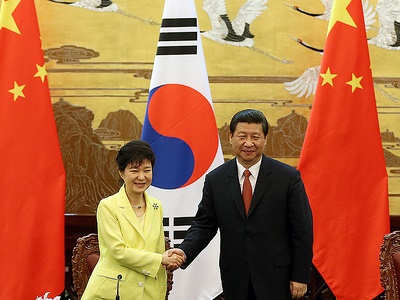At the summit between President Park and President Xi Jinping, Seoul and Beijing agreed to strengthen their strategic communication and consultation processes and created institutions so that these developments are not lost when future administrations come to power. They agreed to establish a direct communication channel between the presidential national security chief of South Korea and China’s state councilor for foreign affairs, and to make sure their foreign ministers visit each other regularly. Given that Seoul had difficulties in talking to Chinese policymakers when they disagreed in recent years, the agreements will be a big boost, allowing for regular and frequent dialogue and interactions with Seoul’s Chinese counterparts.
In addition, in a joint statement adopted after the summit between Park and Xi, Seoul and Beijing agreed to develop mutual relations in accordance with the principle of equality and international norms. As China continues to grow rapidly, South Korea, like many other countries, has had difficulties in convincing China to pay attention to its interests and concerns. By having China agree to respect these principles, Seoul has created a yardstick to refer to when differences with Beijing arise in the future. If Beijing adheres to these principles in managing its relations with Seoul, it will help ease concerns about the long-term intentions of a rising China, which would also lessen the perception of China as a threat in South Korea, and probably in East Asia too.
The main reason why the summit between Park and Xi was more successful than previous meetings was largely thanks to the commitment to reaching an outcome from both sides. While Seoul remains a stalwart ally of Washington, Park has seen a growing need for better relations with Beijing. By trying to win the hearts not only of Chinese leaders but also of the Chinese people, Park distanced herself from her predecessor. On the other hand, Xi and other Chinese leaders want to influence the policy direction of Korea’s new government as America rebalances toward Asia and China competes with Japan.
But this does not mean that Seoul and Beijing now see eye to eye on all or even most of the important issues. On the thorny issue of handling North Korea, for instance, differences remained clear. While Beijing agreed with Seoul to make joint efforts to denuclearize the Korean Peninsula, it stopped short of singling out Pyongyang as the ultimate source of the nuclear problem. By emphasising dialogue as the solution to the nuclear problem, Beijing backtracked to the position it had maintained until May 2009 when North Korea carried out its second nuclear test, instead of coming around to Seoul’s and Washington’s perspective and exerting pressure on Pyongyang to halt its nuclear program.
In the future, denuclearisation and the ROK–China FTA will be some of the key isues that test whether South Korea and China can finally build up mutual trust and advance their bilateral relations. For now, however, these new developments are a positive step toward better managing the challenges to this relationship.
Jae Cheol Kim is Professor of International Studies at the Catholic University of Korea.


It’s like asking if USA could be an EU partner. Of course it could be!